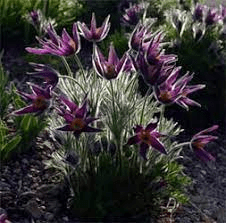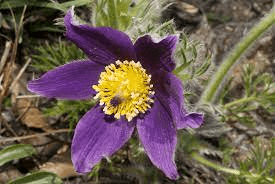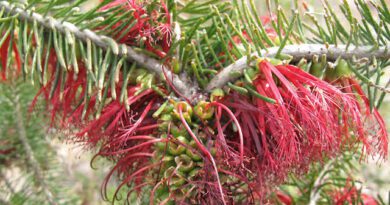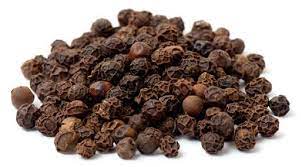20 Medicinal Health Benefits Of Pasque Flower (Pulsatilla vulgaris)
The Pasque Flower, scientifically known as Pulsatilla vulgaris, is a charming and early-blooming perennial herbaceous plant belonging to the buttercup family, Ranunculaceae.
It is native to Europe, Pasque Flower is known for its distinctive and delicate appearance, marking the arrival of spring with its nodding bell-shaped flowers and finely dissected foliage.
Pasque Flower typically grows in well-drained, calcareous soils and can be found in meadows, rocky hillsides, and open woodlands. The plant forms a low tuft of finely divided leaves that emerge from the base, creating an attractive rosette.
As the weather warms in early spring, the plant produces solitary, bell-shaped flowers on long stems, ranging in color from shades of violet and blue to occasionally white. The silky hairs covering the floral parts add to the plant’s ethereal beauty.
The name “Pasque” is derived from the Old French word “pasque,” meaning Easter, which aligns with the timing of the plant’s flowering season, typically around the same time as the Christian celebration of Easter.
Apart from its aesthetic appeal, Pasque Flower has historical significance and has been associated with various folk traditions and medicinal uses. In some cultures, the plant was believed to possess protective or magical properties, and its dried flowers were sometimes used in sachets or charms.
In terms of medicinal uses, parts of the Pasque Flower contain substances that can be toxic, and it is not commonly used in contemporary herbal medicine. However, in traditional practices, the plant has been employed for ailments such as coughs and nervous disorders.
Conservation efforts have been directed towards Pasque Flower in certain regions, as it faces threats from habitat loss and changes in land use. The plant’s sensitivity to disturbance and slow reproductive rate contribute to its vulnerability.
Pasque Flower serves as a reminder of the delicate beauty of early spring and the importance of preserving diverse ecosystems. Whether adorning natural landscapes or cultivated gardens, this charming wildflower captivates with its ephemeral blooms, contributing to the rich tapestry of biodiversity.
The Botanical Description of Pasque Flower
1. Life: The Pasque flower, scientifically known as Pulsatilla vulgaris, belongs to the Ranunculaceae family. It is a perennial herbaceous plant with a distinctive and captivating appearance.
2. Size and Structure: Typically, Pasque flowers stand at a height of 10 to 30 centimeters. The plant features finely divided, fern-like leaves, and the flowers bloom individually on long stems.
3. Flowers: The star attraction of the Pasque flower is its blooms. These flowers have a bell-shaped structure with a diameter of about 3 to 7 centimeters. The color palette includes shades of purple, lavender, blue, and sometimes white.
4. Foliage: The finely dissected leaves emerge before the flowers, creating an attractive basal rosette. The foliage is covered in fine hairs, adding to the plant’s unique texture.
5. Lifecycle: Pasque flowers are early bloomers, often flowering in spring. The bloom time is followed by the development of feathery seed heads. The plant has a fascinating lifecycle, playing a role in the ecological balance of its habitat.
6. Adaptations: As a native of meadows and prairies, Pasque flowers have adaptations that enable them to thrive in specific environmental conditions. These adaptations contribute to the plant’s resilience and survival.
7. Root System: Beneath the soil, Pasque flowers develop a robust root system. This system aids in nutrient absorption, stability, and serves as a storage organ for the plant.
8. Symbolic Features: Pasque flowers often hold symbolic significance. In various cultures, they are associated with rebirth, new beginnings, and the arrival of spring, making them a cherished and culturally significant botanical specimen.
9. Cultivars and Varieties: Beyond the wild species, cultivars and varieties of Pasque flowers have been developed for cultivation in gardens. These variations may exhibit unique colors, sizes, or growth habits, offering horticultural enthusiasts a diverse range of options.
The Geographic Distribution of Pasque Flower
1. Natural Habitats: Pasque flowers are native to a diverse range of habitats, including meadows, prairies, and open woodlands. They are often found in regions with well-drained soils.
2. Global Distribution: The natural range of Pasque flowers extends across Europe, Asia, and North America. Different species may have specific geographic locations where they thrive.
3. Altitude Preferences: Some Pasque flower species display preferences for specific altitudes. They can be found in lowland areas as well as in mountainous regions, showcasing their adaptability.
4. Soil Types: The plant is known to tolerate various soil types, including sandy, loamy, and rocky soils. Well-drained soil is a common characteristic of the habitats where Pasque flowers flourish.
5. Climate Zones: Pasque flowers can be found in a variety of climate zones, from temperate to subarctic. Their ability to adapt to different climates contributes to their widespread distribution.
6. Conservation Status: While Pasque flowers are not typically considered endangered, certain species or varieties may face threats due to habitat loss or other environmental factors. Conservation efforts may be implemented to protect these beautiful wildflowers.
7. Cultivation in Gardens: Pasque flowers have become popular ornamental plants in gardens worldwide. Their adaptability to diverse climates has made them sought-after additions to horticultural landscapes.
8. Horticultural Zones: Depending on the species or variety, Pasque flowers may be suitable for cultivation in specific horticultural zones. Understanding the ideal conditions for each type ensures successful cultivation.
The Chemical Composition of Pasque Flower
1. Alkaloids: Pasque flowers contain alkaloids, which are natural compounds with potential pharmacological effects. These alkaloids contribute to the plant’s medicinal properties.
2. Flavonoids: Flavonoids, known for their antioxidant properties, are present in Pasque flowers. These compounds play a role in the plant’s interaction with its environment and may offer health benefits.
3. Terpenoids: Terpenoids, a diverse group of organic compounds, are found in Pasque flowers. These compounds contribute to the plant’s aroma and may have ecological functions.
4. Essential Oils: Some Pasque flower species produce essential oils. These oils can have aromatic qualities and may be explored for their potential applications.
5. Glycosides: Pasque flowers may contain glycosides, compounds that are often involved in various physiological processes in plants.
6. Tannins: Tannins, known for their astringent properties, are present in Pasque flowers. These compounds may contribute to the plant’s defense mechanisms.
7. Resins: Pasque flowers produce resins, which can have protective functions against herbivores and pathogens.
8. Proteins: Like all plants, Pasque flowers contain proteins that are essential for various biological processes within the plant.
9. Lignans: Lignans, compounds derived from phenolic substances, are part of Pasque flower’s chemical makeup.
10. Carotenoids: Some Pasque flowers may contain carotenoids, pigments with potential antioxidant properties.
11. Saponins: Pasque flowers may contain saponins, which are glycosides with foaming properties and may have diverse biological activities.
12. Organic Acids: Organic acids contribute to the overall chemical composition of Pasque flowers and may influence the plant’s interactions with its surroundings.
Read Also: Steps to Combat Heat Stress in Poultry Birds
The Medicinal Health Benefits Of Pasque Flower (Pulsatilla vulgaris)

1. Anti-inflammatory Properties: Pasque flowers have been traditionally associated with anti-inflammatory effects, making them potentially beneficial for conditions involving inflammation.
2. Analgesic Effects: The plant may exhibit analgesic properties, offering relief from pain and discomfort.
3. Respiratory Health: Pasque flowers are believed to have positive effects on respiratory health, with traditional uses for addressing coughs and respiratory conditions.
4. Relaxant Properties: Some traditional uses suggest that Pasque flowers may have relaxant properties, contributing to stress relief and relaxation.
5. Antispasmodic Effects: Pasque flowers may act as antispasmodics, potentially providing relief from muscle spasms.
6. Sleep Aid: The plant has been traditionally used for its potential calming effects, promoting better sleep and addressing sleep-related issues.
7. Immune System Support: Compounds in Pasque flowers may contribute to immune system support, enhancing the body’s natural defense mechanisms.
8. Skin Conditions: Topical applications of Pasque flower extracts may be beneficial for certain skin conditions, contributing to skin health.
9. Menstrual Health: Traditional uses include Pasque flowers for addressing certain menstrual issues, suggesting potential benefits for women’s health.
10. Gastrointestinal Relief: Pasque flowers may offer relief for certain gastrointestinal issues, with traditional uses for digestive health.
11. Antioxidant Effects: The presence of flavonoids and other compounds in Pasque flowers suggests potential antioxidant effects, protecting cells from oxidative stress.
12. Adaptogenic Properties: The plant’s adaptogenic properties may contribute to overall well-being, helping the body adapt to stressors.
13. Cardiovascular Health: Some traditional uses include Pasque flowers for cardiovascular health, suggesting potential benefits for the heart and circulatory system.
14. Anti-infective Properties: Pasque flowers may have anti-infective properties, contributing to their traditional uses for infectious conditions.
15. Mental Health Support: The relaxant and stress-relieving properties of Pasque flowers may provide support for mental well-being.
16. Wound Healing: Topical applications of Pasque flower extracts may support wound healing, with traditional uses for skin injuries.
17. Anti-allergic Effects: Pasque flowers may exhibit anti-allergic effects, potentially beneficial for individuals with allergies.
18. Anti-fungal Properties: Some traditional uses include Pasque flowers for addressing fungal infections, suggesting potential anti-fungal properties.
19. Antiviral Effects: Pasque flowers may have antiviral effects, contributing to their traditional uses for viral infections.
20. Anti-cancer Potential: Preliminary research suggests that certain compounds in Pasque flowers may have anti-cancer properties, although further studies are needed for conclusive evidence.
The Methods of Usage to Achieve the Provided Health Benefits Of Pasque Flower (Pulsatilla vulgaris)
1. Herbal Infusions: Prepare herbal infusions using dried Pasque flower leaves or petals. This can be consumed as a soothing tea to harness its potential health benefits.
2. Tinctures: Tinctures are concentrated liquid extracts. Pasque flower tinctures can be taken orally, following recommended dosage guidelines.
3. Topical Applications: For skin conditions, create salves or creams using Pasque flower extracts. Apply topically to the affected area for potential skin health benefits.
4. Inhalation: Inhaling the aroma of Pasque flower essential oils or dried petals may offer respiratory benefits and promote relaxation.
5. Capsules or Tablets: Pasque flower supplements in capsule or tablet form may provide a convenient way to incorporate its health benefits into a daily routine.
6. Poultices: For wound healing or localized pain relief, poultices made with Pasque flower extracts can be applied externally.
7. Aromatherapy: Diffusing Pasque flower essential oil may contribute to a calming atmosphere, supporting mental well-being.
8. Culinary Uses: In some cultures, Pasque flowers are used in culinary preparations. However, caution is advised due to potential toxicity, and it’s essential to use the plant under expert guidance.
9. Flower Essence: Pasque flower essence, a preparation capturing the plant’s energetic imprint, may be used for emotional or spiritual well-being.
10. Traditional Practices: Depending on cultural traditions, Pasque flowers may be incorporated into various traditional practices for health and well-being.
The Side Effects Of Using Pasque Flower Medicinal Plant
1. Skin Irritation: Some individuals may experience skin irritation or allergic reactions when using Pasque flower topically. Perform a patch test before extensive use.
2. Gastrointestinal Upset: In some cases, Pasque flower supplements may cause gastrointestinal upset. Monitor your digestive health and discontinue use if adverse effects occur.
3. Pregnancy and Breastfeeding: Pregnant and breastfeeding individuals should avoid Pasque flower due to its traditional use for menstrual health, which may have implications for pregnancy.
4. Allergic Reactions: Individuals with allergies, especially to plants in the Ranunculaceae family, should exercise caution and consult with healthcare professionals before using Pasque flower.
5. Interaction with Medications: Pasque flowers may interact with certain medications. Consult with a healthcare provider, especially if taking prescription drugs.
6. Toxicity: Pasque flowers contain compounds that can be toxic in large quantities. Adhere strictly to recommended dosage guidelines to avoid potential toxicity.
7. Central Nervous System Effects: Excessive consumption of Pasque flowers may have central nervous system effects. Avoid activities that require mental alertness until the plant’s effects are understood.
8. Cardiovascular Effects: Individuals with cardiovascular conditions should use Pasque flower under medical supervision, as it may have effects on the circulatory system.
9. Respiratory Effects: Some individuals may experience respiratory effects. If you have respiratory conditions, use Pasque flower cautiously and consult with healthcare professionals.
10. Liver Health: Individuals with liver conditions should exercise caution, as Pasque flowers may impact liver function.
11. Blood Pressure: Pasque flowers may influence blood pressure levels. Regular monitoring is advisable, especially for individuals with blood pressure concerns.
12. Hormonal Balance: Due to its traditional use for menstrual health, Pasque flowers may influence hormonal balance. Individuals with hormone-sensitive conditions should use it cautiously.
13. Photosensitivity: Some individuals may experience increased sensitivity to sunlight after using Pasque flowers. Use sun protection measures to avoid sun-related skin issues.
Read Also: 17 Medicinal Health Benefits Of Guggul (Commiphora wightii)
The Scientific Research and Studies of Pasque Flower (Pulsatilla vulgaris)

1. Anti-Inflammatory Effects: Scientific studies have explored the anti-inflammatory properties of Pasque flowers, indicating potential benefits for inflammatory conditions.
2. Antimicrobial Activity: Research suggests that Pasque flowers may possess antimicrobial activity, supporting their traditional use for infections.
3. Analgesic Properties: Studies have investigated the analgesic effects of Pasque flowers, pointing towards potential pain-relieving properties.
4. Respiratory Benefits: Scientific research has explored the respiratory benefits of Pasque flowers, validating their traditional uses for respiratory health.
5. Adaptogenic Effects: Pasque flowers’ adaptogenic properties have been studied, indicating their potential role in stress management and overall well-being.
6. Cardiovascular Health: Some studies have examined the cardiovascular effects of Pasque flowers, shedding light on their impact on the circulatory system.
7. Antioxidant Potential: Pasque flowers have demonstrated antioxidant potential in scientific studies, suggesting cellular protection against oxidative stress.
8. Anti-Cancer Properties: Preliminary research has investigated the potential anti-cancer properties of certain compounds found in Pasque flowers. However, further studies are needed for conclusive evidence.
9. Immunomodulatory Effects: Scientific investigations suggest that Pasque flowers may have immunomodulatory effects, influencing the immune system’s response.
10. Neurological Effects: Research has explored the neurological effects of Pasque flowers, providing insights into their impact on the central nervous system.
11. Dermatological Applications: Studies have examined the dermatological applications of Pasque flowers, supporting their traditional use for skin health.
The Safety Precautions and Recommendations In Using Pasque Flower (Pulsatilla vulgaris) Medicinal Plant
1. Dosage Guidelines: Adhere strictly to recommended dosage guidelines provided by healthcare professionals or product labels. Excessive consumption may lead to adverse effects, including toxicity.
2. Allergy Testing: Perform a patch test before applying Pasque flower extracts topically to ensure that you do not experience skin irritation or allergic reactions. Discontinue use if any adverse reactions occur.
3. Pregnancy and Lactation: Pregnant and breastfeeding individuals should avoid the use of Pasque flower due to potential effects on pregnancy and lactation.
4. Liver Conditions: Individuals with liver conditions should exercise caution when using Pasque flowers, as excessive consumption may impact liver function.
5. Blood Pressure Monitoring: If you have cardiovascular concerns, monitor your blood pressure regularly while using Pasque flowers. Consult with healthcare professionals for guidance.
6. Interaction with Medications: Pasque flowers may interact with certain medications. If you are taking prescription drugs, consult with your healthcare provider before using Pasque flower supplements.
7. Central Nervous System Effects: Be cautious if using Pasque flowers, especially in large quantities, as they may have central nervous system effects. Avoid activities that require mental alertness until the plant’s effects are understood.
8. Respiratory Conditions: Individuals with respiratory conditions should use Pasque flowers cautiously, as the plant may have respiratory effects. Consult with healthcare professionals if you have concerns.
9. Photosensitivity: Some individuals may experience increased sensitivity to sunlight after using Pasque flowers. Use sun protection measures to avoid potential sun-related skin issues.
10. Hormone-Sensitive Conditions: Due to its traditional use for menstrual health, Pasque flowers may influence hormonal balance. Individuals with hormone-sensitive conditions should use it cautiously and seek medical advice.
11. Children and Pets: Keep Pasque flower products out of reach of children and pets. The plant’s toxicity may pose risks if ingested, and caution should be exercised in households with curious children or pets.
12. Quality of Products: Ensure the quality and purity of Pasque flower products. Choose reputable sources and manufacturers to guarantee that the products meet safety and quality standards.
13. Duration of Use: Use Pasque flowers for the recommended duration, and avoid prolonged or excessive consumption without appropriate medical supervision.
14. Consulting Healthcare Professionals: Before incorporating Pasque flowers into your health regimen, especially for therapeutic purposes, consult with healthcare professionals to ensure its appropriateness for your individual health needs.
15. Monitoring for Side Effects: Regularly monitor for any side effects or changes in your health while using Pasque flowers. If you experience adverse effects, discontinue use and seek medical attention if necessary.
16. Educate Yourself: Gain a thorough understanding of Pasque flowers, their potential benefits, and associated risks before using them. Informed decisions contribute to a safer and more effective usage.
17. Personal Sensitivities: Individuals with known sensitivities to plants in the Ranunculaceae family should exercise caution when using Pasque flowers and consult with healthcare professionals.
18. Cultural Considerations: Respect cultural traditions and practices associated with Pasque flowers. Understand their significance in different cultures to use them respectfully and appropriately.
19. Storage Conditions: Store Pasque flower products in appropriate conditions, following guidelines provided by manufacturers. Proper storage helps maintain the efficacy and safety of the products.
20. Reporting Adverse Effects: If you experience unexpected or severe side effects from Pasque flowers, report them to healthcare professionals and relevant regulatory authorities. This contributes to the overall understanding of the plant’s effects.
FAQs About Pasque Flower (Pulsatilla vulgaris) Medicinal Plant
1. What is the best way to consume Pasque flowers for medicinal purposes?
Pasque flowers can be consumed in various forms, including herbal infusions, tinctures, and capsules. The choice depends on individual preferences and health goals. It’s advisable to consult with healthcare professionals for personalized recommendations.
2. Can Pasque flowers be used for children?
Due to the potential toxicity of Pasque flowers, especially in large quantities, they are not recommended for children without proper medical supervision. Consult with healthcare professionals before considering their use for children.
3. Are there any known drug interactions with Pasque flowers?
Pasque flowers may interact with certain medications, and individuals taking prescription drugs should consult with their healthcare providers before using Pasque flower supplements to avoid potential interactions.
4. Is it safe to use Pasque flowers during pregnancy?
Pregnant individuals should avoid the use of Pasque flowers due to their traditional association with menstrual health, which may have implications for pregnancy. Consult with healthcare professionals for guidance.
5. Can Pasque flowers be grown in home gardens?
Certain Pasque flower species and cultivars are suitable for cultivation in home gardens. Consider factors such as climate, soil conditions, and horticultural zones when planning to grow Pasque flowers. Ensure that you choose non-toxic varieties if you have children or pets.
6. How can I identify Pasque flowers in the wild?
Pasque flowers are characterized by their distinctive bell-shaped flowers, finely divided leaves, and low growth habit. Field guides, botanical resources, or local experts can help in accurate identification. Exercise caution in the wild, as some species may resemble toxic plants.
7. Are there any cultural traditions associated with Pasque flowers?
Pasque flowers hold cultural significance in various traditions, often symbolizing rebirth, new beginnings, and the arrival of spring. Explore cultural narratives and traditions associated with Pasque flowers to appreciate their symbolic value.
8. Can Pasque flowers be used for mental health support?
The relaxant and stress-relieving properties of Pasque flowers suggest potential support for mental well-being. However, individual responses may vary, and it’s essential to consult with healthcare professionals for personalized guidance on using Pasque flowers for mental health.
9. Are there any restrictions on the duration of Pasque flower use?
Follow recommended dosage guidelines and avoid prolonged or excessive use of Pasque flowers without appropriate medical supervision. Monitoring for side effects and seeking healthcare advice contribute to safe and effective usage.
10. Are there alternatives to Pasque flowers with similar health benefits?
While Pasque flowers have unique properties, other botanicals with similar health benefits may be considered. However, individual responses to different plants vary, and consulting with healthcare professionals helps identify suitable alternatives based on individual health needs.
Read Also: How to Grow Microgreens









